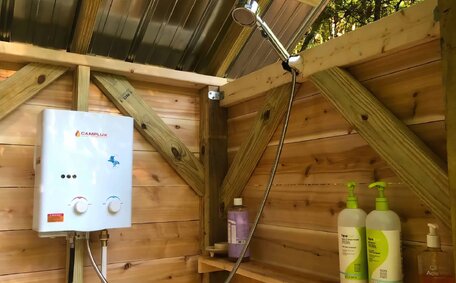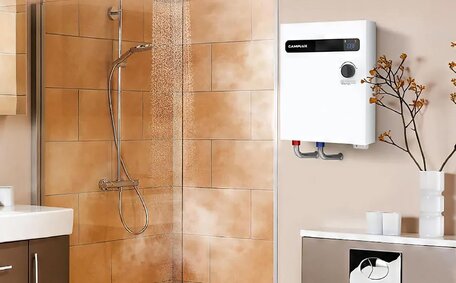Introduction to Mould and Mildew Problems in the Home
Mould and mildew often start in moist areas of the home, such as bathrooms or kitchens, due to their ideal warm and humid conditions for fungal growth.
If not tackled early, mould can spread swiftly to walls, ceilings, and tiles, causing not only structural damage but also health risks like respiratory problems and allergies. A face mask may alleviate chronic symptoms.
Professional plumbers are essential in resolving mould and mildew issues. They combat these problems by detecting leaks, repairing drainage, and enhancing ventilation to tackle excess moisture at its source.
Prompt action upon noticing mould is critical for your home’s integrity and your family’s health. Contact your plumber for an inspection if you observe dark spots or a musty odour, as they may signal a plumbing problem.
What Causes Mould and Mildew Growth?
There are a few most common factors that can lead to mould and mildew growth in homes:
- Moisture - Excessive moisture creates an ideal breeding ground for mould, facilitating its rapid spread and mildew development. Leaky plumbing fixtures, flooding, condensation, and high humidity all enable moisture buildup on surfaces.
- Warmth - Mould thrives in temperatures between 20-32°C (68-90°F), a common range for bathroom climates, which expedites mildew formation. Bathrooms and kitchens often fall within this range.
- Nutrients - Mould feeds on indoor organic materials like wood, drywall, and carpets, aiding its growth.
- Poor ventilation - Inadequately ventilated bathrooms fail to expel moisture effectively, inducing mould proliferation. This situation mould mildew damp your surfaces, risking fungal growth within your domain.
Check areas with hidden dampness such as behind walls, under sinks, inside cabinets, or near leaking appliances, as these are hotspots for spontaneous mould and mildew development.
While mould spores are present everywhere, excess moisture is the key factor allowing colonies to establish and proliferate, thus creating a breeding ground for mold. Controlling indoor moisture levels to prevent an environment mould flourishes in through proper plumbing maintenance and ventilation is crucial for halting mold growth and preventing conducive conditions for mould and mildew.
Common Sources of Excess Moisture
There are several common ways that excess moisture can accumulate in a home and lead to mould growth if left unchecked:
- Leaks - Unnoticed dripping taps, pipes, and water systems can introduce mould into walls and cabinets, triggering significant problems.
- Condensation - A common culprit for home mould issues is the steam from showers, cooking, or even breathing that condenses on cooler surfaces.
- Flooding - Major flooding from storms, appliances or pipe bursts delivers volumes of water sometimes comparable to the intensity of sending boiling water down the drain. But even minor events like overflowing sinks or clogged drains can cause moisture issues.
- Groundwater - High groundwater levels or inadequate drainage can also cause water to seep into basements.
- Rainwater - Poorly maintained roofs, gutters, windows and exterior walls can lead mold to flourish by creating conditions for rainwater penetration and accumulation inside.
Proactively protecting your home against mould involves diligent steps to prevent growth in your home’s plumbing system and water entry points. Ignoring small drips or damp areas can lead to significant mould problems.
Plumbing Issues That Lead to Mould
Defective plumbing can enable mould infestation by allowing water to accumulate, making it crucial to resolve these issues swiftly. Here are some common plumbing problems in your house that can help prevent mold mildew if addressed timely:
- Leaks - Slow drips from fixtures, pipes, taps and toilet cisterns can leave puddles where mildew can grow into walls, cabinetry, floors, and other concealed spaces.
- Clogged drain pipes complications - Blocked drains and pipes prevent water from properly draining, causing backups and water spills that lead to dampness.
- Shower and tile defects - Deficient grout or shower curtains can cause water seepage into walls, fostering mildew growth.
- Condensation - Excess condensation forms on cold surfaces when warm, moist air cannot ventilate properly in bathrooms.
If you observe peeling surfaces, musty odours, or visible mould near plumbing fixtures, contact an emergency plumber. These signs likely indicate a deeper mould issue necessitating professional intervention. Don’t delay in seeking a plumber’s inspection and resolution of issues that could worsen mould problems.
Signs You May Have a Mould Problem
Several clear indicators can alert you to mould presence in your home:
- Visible mould growth - Look for fuzzy or powdery black, green or white spots on surfaces like walls, ceilings, tiles, grout, carpets and around plumbing fixtures.
- Musty, earthy odour - Mould produces a distinct pungent, musty smell that is noticeable upon entering an affected room.
- Allergy reactions - Mould spores can irritate, causing symptoms such as sneezing and watery eyes.
- Peeling paint or warped surfaces - Mould colonies expanding under paint, drywall or wood can cause these surfaces to crack, peel and warp.
- High condensation - Noticeable moisture on windows could suggest ventilation problems requiring attention to prevent mould.
When encountering small patches of mould or strong odours, recognise these as signs of potential moisture issues needing attention. Promptly seek professional plumbing and mould remediation services to prevent hazardous mould proliferation and associated health issues.
Health Risks of Mould Exposure
Mould exposure presents considerable health dangers, especially to vulnerable groups such as children or those with respiratory conditions. Inhaled mould spores can irritate the respiratory system and may cause allergic reactions, asthma attacks, chronic coughs, and breathing difficulties.
Prolonged exposure has been associated with chronic lung infections, impaired immune function and neurological issues in some cases. Moulds also produce mycotoxins that, while naturally occurring, reinforce the importance of strategies to help prevent mold with high exposure.
Due to these dangers, you should learn how prevent mold and never casually attempt mould removal without professional help. It’s often more than a quick fix; professional water damage restoration is necessary for the thorough, hazard-free eradication of mould, overseen by licenced contractors adhering to safety protocols. Protect your health and your family by acting quickly if you suspect a mould issue.
Preventing Mould and Mildew Growth
There are several effective strategies you can employ to help prevent problematic mould and mildew growth in your home:
- Maintain a fresh bathroom by ensuring proper ventilation. Use exhaust fans during and post-shower, open windows, and check that vents are unobstructed.
- Promptly repair plumbing leaks - Address any leaky faucets, pipes or appliances right away to eliminate moisture accumulation.
- Maintain dry surfaces - Regularly wipe down humid areas with a cup baking soda solution and allow time to fully dry to discourage mould colonies.
- Limit indoor humidity - Use dehumidifiers to maintain humidity below 50% and air out dampness through ventilation.
- Clean with anti-mould solutions - Use mould-inhibiting product treatment designed to prevent regrowth when scrubbing bathrooms.
Keep a vigilant eye and make sure there’s no hidden moisture in cabinets, under sinks, and behind appliances to nip any unseen mould issues in the bud. Keeping your plumbing system well-maintained through regular inspections and promptly addressing any detected leaks or drainage issues is key to preventing the excess moisture mould needs to propagate.
If persistent humidity levels or suspected hidden moisture sources are causing concern, reach out to a local plumber Melbourne-based for an expert assessment. Your local plumber can help identify issues within your plumbing system, identify necessary repairs and offer solutions to improve ventilation and control dampness issues.
Improving Ventilation and Controlling Humidity
Effective ventilation and humidity management are essential to fend off mould and mildew. Here are some tips:
- Install exhaust fans - Exhaust fans above showers and in other mould bathroom areas can actively ventilate moisture. Use them during and after bathing.
- Freshen up by opening windows, especially after showers, to reduce indoor humidity.
- Check existing vents - Ensure bathroom vents, dryer vents and other ventilation pathways are unblocked.
- Add bathroom ventilation - Consider upgrading to a more powerful exhaust fan if moisture persists.
- Use dehumidifiers - Dehumidifiers remove excess moisture from the air in problem rooms.
- Fix plumbing leaks - Promptly repair any plumbing leaks to eliminate a major moisture source.
- Insulate cold pipes - Insulating your water supply pipes when exposed prevents condensation buildup where mildew could otherwise grow.
Aim to keep indoor humidity below 50 percent to aid in strategies that remove mould effectively and prevent mold mildew. If simple venting strategies don’t resolve dampness, don’t hesitate to call a professional plumber. They can assess your home’s ventilation issues and offer solutions to control humidity and curb mould growth.
Fixing Plumbing Problems Promptly
Conduct regular inspections of your plumbing system - check under sinks, along pipes and behind appliances for signs of drips, cracks or water damage. It is crucial to address any plumbing problems or leaks as soon as they are discovered to prevent moisture accumulation and mould growth.
Contact a professional plumber at the first sign of a plumbing issue for immediate repairs. They can locate and fix leaks, replace compromised pipes, and prevent further water intrusion into spaces where unchecked mould can flourish. Delaying repairs can intensify the problem and significantly increase the risk of serious mould infestations.
Establish a preventive maintenance routine by having your plumbing system inspected annually. Regular plumbing inspections can help prevent serious issues by identifying potential faults early before they turn into leaks. With vigilant monitoring and quick response to any plumbing problems, you can help keep excess moisture and resulting mould complications at bay.
Regular Plumbing Inspections and Maintenance
Having your plumbing system regularly checked is the best way to help prevent mould and mildew growth in your home. During an inspection, a plumber will check all fixtures, pipes, and drains for leaks, cracks, or other damage that can lead to excess moisture.
Plumbers evaluate ventilation and humidity around pipes, which can influence damp conditions. They can advise on improvements like installing bathroom exhaust fans, sealing pipe penetrations, and maintaining proper drainage slopes. Annual inspections enable the early detection and repair of plumbing faults before they worsen into leaks and moisture accumulation.
Establishing a routine plumbing maintenance schedule following inspections is prudent. This involves periodically checking for water leaks, replacing old fixtures, clearing drain obstructions, and servicing water heaters. Proactive plumbing maintenance paired with professional inspections helps ensure your system operates safely and efficiently while reducing mould risks.
Professional Mould Remediation
Items with removable mould should be thoroughly cleaned or discarded. Porous materials like carpets and drywall heavily afflicted with mould must be removed for effective remediation.
Only licenced specialists should attempt mould remediation due to the expertise needed to completely eliminate colonies and associated hazards. Mould infestations should only be handled by trained professionals as improper removal can increase health risks. First, the contaminated area is isolated by sealing vents, doors and windows with plastic sheeting. Qualified remediators utilise protective gear like respirators, gloves and full-body suits for safe containment. Finally, an antimicrobial solution is applied to treat affected areas and prevent recurrence.
When to Call a Professional Plumber
In specific scenarios, it is essential to consult a professional plumbing service like Cranebrook Plumbing rather than attempt DIY repairs.
If you notice persistent signs of moisture or high indoor humidity that ventilation improvements and dehumidifiers cannot resolve, a plumber’s assessment is advisable. They can identify and fix any underlying plumbing issues enabling moisture accumulation.
For recurring mould and mildew outbreaks despite your remediation efforts, contact professional help like a plumber who can pinpoint and remedy the root causes such as faulty plumbing. This prevents wasted time and money tackling the problem over and over.
Major renovations involving plumbing modifications require a licenced professional to ensure work is up to code. Trying to DIY complex jobs like moving pipes or installing new fixtures risks safety hazards if improperly handled.
While minor leaks or drainage clogs may be DIY-friendly, extensive moisture damage, mould infestations and complex plumbing problems are best left to the expertise of licenced plumbers like Cranebrook Plumbing. Don’t hesitate to call them for inspection and repairs.
Conclusion
By improving ventilation to control humidity and using moisture-resistant building materials, plumbers can address the underlying causes of mould and mildew proliferation.
Don’t delay in contacting licenced specialists like Cranebrook Plumting mould and mildew while protecting your family’s health.
Instead of short-term remedies, depend on the thorough solutions a professional plumber can provide to tackle your home’s mould issues at the source. Coupled with expert remediation, rectifying underlying plumbing and ventilation issues offers the most reliable long-term protection against harmful mould growth.






